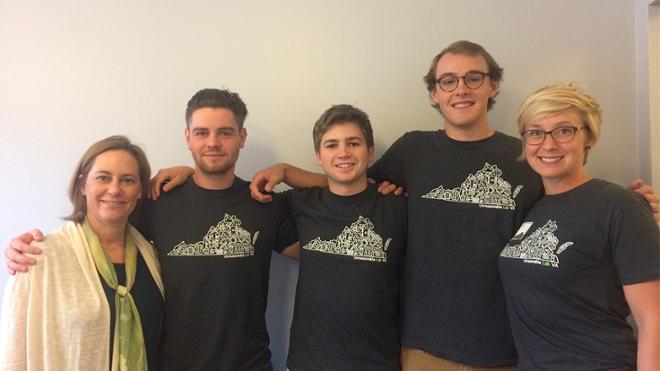Professor Gives Students a Hands On Look at Entrepreneurship
Susan Cohen, assistant professor of management at the Robins School of Business, is finding new ways to teach her students about entrepreneurship.
“It’s energizing for them,” Cohen said. “And the community benefits as well. Showcasing our students in a broader environment helps build our reputation as a leader locally.”
Cohen mentors entrepreneurs in Richmond through programs like the Unreasonable Institute, a short term entrepreneurship program for budding entrepreneurs trying to jump start their companies to have a social impact on the broader community.
“Entrepreneurship is a really important driver of the US economy,” Cohen said. “It’s a driver of jobs. Accelerators are organizations that are trying to increase the odds of a company’s success.”
So she decided to find a way to give her students a hands on experience in the world of accelerators, and teach them about social entrepreneurship.
She invited Anika Horn, co-founder of the Unreasonable Institute, to speak to her classes about how to jumpstart a social venture, and how people can make a difference by creating and supporting such businesses. Horn then partnered with Cohen to get students involved at the Unreasonable Institute.
“Once you talk and actively interact with a company’s founder for an hour, you will gain so much more in depth understanding of the real issue,” Horn said. “You get much more of a sense of the entrepreneurial spirit when you’re in the room with them and interacting with them.”
“I learned so much from the experience I had with Unreasonable Lab VA,” said senior Bailey Schrader. “Talking with people who are encountering problems I might encounter in the future was extremely helpful.”
Schrader worked hand in hand with other budding entrepreneurs in the area, which he thinks helped spark new ideas for their companies.
“I believe that I was able to help some of the founders,” Schrader said. “And that always feels very good.”
“Our students really shine,” Cohen said of the program. “Anytime we can integrate classroom experience with real world experience, we boost confidence. It helps them see how to apply what we learn in the real world, and it deepens their understanding of the concepts.”
Her Research and Courses
Cohen was the first scholar to research accelerators and their impact on the entrepreneurial landscape in the United States. Accelerators are short term entrepreneurship education programs that helps cohorts of startups develop by providing significant mentorship and seed capital. The first accelerator opened for business in 2005, and Cohen began studying their impact and practices in 2011.
Cohen teaches our introductory entrepreneurship course, which explores who entrepreneurs are, what they do, and why some are more successful than others. It also provides an introduction to venture finance.
“We discuss a broad range of topics, from where ideas come from, how to evaluate potential business concepts, how to derisk businesses through validation, how to grow and scale, and finally how to fund startups,” Cohen said.
Since their inception, accelerators have helped startups raise more than $20 billion in the United States. Companies like AirBnB and Dropbox are just some examples of companies that went through accelerators.
“Accelerators can change the entrepreneurial landscape,” Cohen said. That power is what fascinates her about accelerators, and inspired her to study how companies go through these programs, how they learn, and how they grow.
Student Impact
John Failla, UR 2015, is just one of the students who says his company wouldn’t be succeeding without Susan Cohen. Failla started Trilogy Mentors in Richmond, an online tutoring program for underprivileged kids.
“When I met with Susan, immediately she pointed out things I hadn’t even thought of, but were going to be big hurdles for my company,” Failla said. “She’s really good at keeping you grounded.”
Failla is returning to Robins this month to be a live case for Cohen’s entrepreneurship students.
“Our students get to apply what they have learned to one of John’s current challenges,” Cohen said. “This is a great example of how interaction between our students, alums and the entrepreneurial ecosystem helps all of us. John will talk about his transition from student to entrepreneur, while also getting valuable feedback about his product.”
